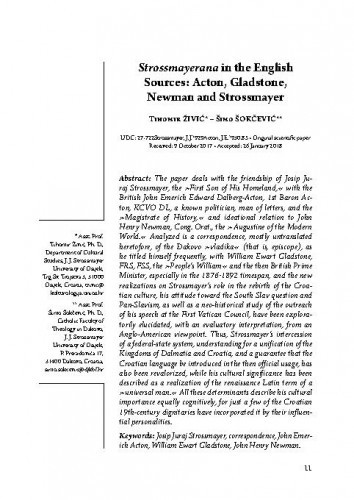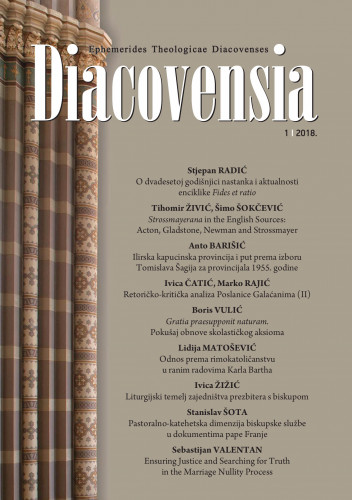The paper deals with the friendship of Josip Juraj Strossmayer, the »First Son of His Homeland,« with the British John Emerich Edward Dalberg-Acton, 1st Baron Acton, KCVO DL, a known politician, man of letters, and the »Magistrate of History,« and ideational relation to John Henry Newman, Cong. Orat., the »Augustine of the Modern World.« Analyzed is a correspondence, mostly untranslated heretofore, of the Đakovo »vladika« (that is, episcope), as he titled himself frequently, with William Ewart Gladstone, FRS, FSS, the »People’s William« and the then British Prime Minister, especially in the 1876‒1892 timespan, and the new realizations on Strossmayer’s role in the rebirth of the Croatian culture, his attitude toward the South Slav question and Pan-Slavism, as well as a neo-historical study of the outreach of his speech at the First Vatican Council, have been exploratorily elucidated, with an evaluatory interpretation, from an Anglo-American viewpoint. Thus, Strossmayer’s intercession of a federal-state system, understanding for a unification of the Kingdoms of Dalmatia and Croatia, and a guarantee that the Croatian language be introduced in the then official usage, has also been revalorized, while his cultural significance has been described as a realization of the renaissance Latin term of a »universal man.« All these determinants describe his cultural importance equally cognitively, for just a few of the Croatian 19th-century dignitaries have incorporated it by their influential personalities.; Rad obrađuje prijateljstvo Josipa Jurja Strossmayera, „prvoga sina Domovine“, s britanskim plemićem Johnom Emerichom Actonom, poznatim državnikom, književnikom i „sudcem povijesti“, te Strossmayerov odnos s Johnom Henryjem Newmanom, „Augustinom suvremenoga svijeta“. Razmotrena je razmjena dosad većinom neprevedenih pisama đakovačkoga „vladike“, kako se i sam često nazivao, i Williama Ewarta Gladstonea, „pučkoga Williama“ i tadašnjega britanskog predsjednika Vlade, i to poglavito u razdoblju od 1876. do 1892., a s angloameričkoga su motrišta, uz prosudbeno tumačenje, istraživački rasvijetljene nove spoznaje o Strossmayerovoj ulozi u preporodu hrvatske prosvjete, njegov stav prema južnoslavenskome pitanju i sveslavenstvu, kao i novopovijesna raščlamba dosegâ njegova istupa na Prvome vatikanskom saboru. Time je prevrednovan i Strossmayerov zagovor saveznoga državnog uređenja, razumijevanja za sjedinjenje kraljevinâ Dalmacije i Hrvatske te jamčenja da hrvatski jezik bude uveden u onodobnu službenu uporabu, a njegovo uljudbeno značenje opisano kao oživotvorenje preporodnoga latinskog pojma „svestranoga čovjeka“. Sve ove odrednice jednako spoznajno opisuju njegov prosvjetni značaj, jer samo je nekolicina hrvatskih devetnaestostoljetnih dostojanstvenika koji su ga utjelovili u svojim utjecajnim ličnostima.
Sažetak

 Diacovensia : teološki prilozi : 26,1(2018) / glavni i odgovorni urednik, editor-in-chief Šimo Šokčević.
Diacovensia : teološki prilozi : 26,1(2018) / glavni i odgovorni urednik, editor-in-chief Šimo Šokčević.